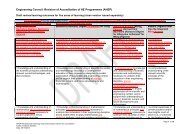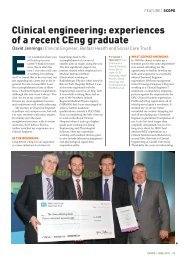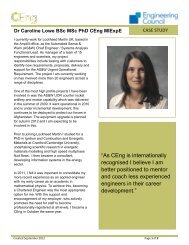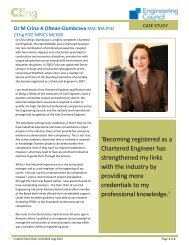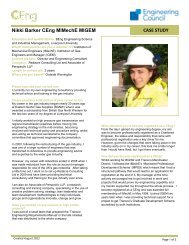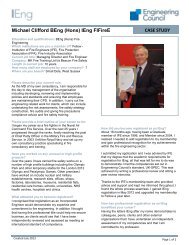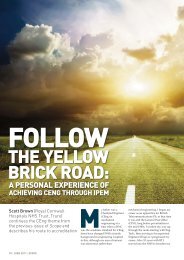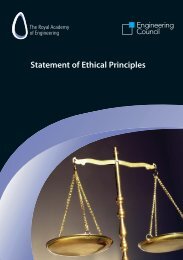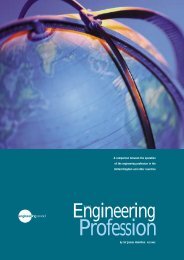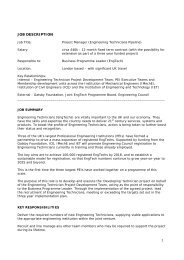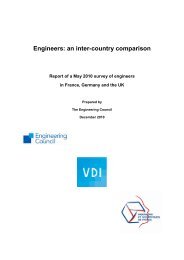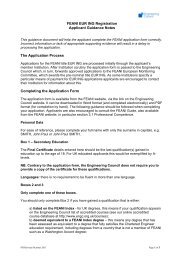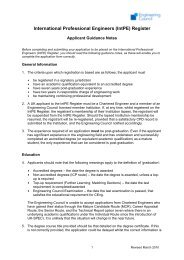An Engine for Change - A Chronicle of the Engineering Council
An Engine for Change - A Chronicle of the Engineering Council
An Engine for Change - A Chronicle of the Engineering Council
Create successful ePaper yourself
Turn your PDF publications into a flip-book with our unique Google optimized e-Paper software.
222A CHRONICLE OF THE ENGINEERING COUNCILSuggestions <strong>for</strong> future prioritiesInstitution <strong>of</strong> Mechanical <strong>Engine</strong>ers*Somehow we have to get away from <strong>the</strong> constant criticism, ill-feeling, and sniping at <strong>the</strong><strong>Engine</strong>ering <strong>Council</strong>. Somehow we have to get a situation where <strong>the</strong> Institutions really d<strong>of</strong>eel some ownership <strong>of</strong> <strong>the</strong> <strong>Engine</strong>ering <strong>Council</strong>. We should not lose sight <strong>of</strong> <strong>the</strong> fact that<strong>the</strong>re are 39 Institutions (16 <strong>of</strong> <strong>the</strong>m Chartered) who look after Chartered and Incorporated<strong>Engine</strong>ers and <strong>Engine</strong>ering Technicians. The Big-4 would claim that <strong>the</strong>ir members comprisea large proportion <strong>of</strong> <strong>the</strong> <strong>Engine</strong>ering <strong>Council</strong> Registrants (and this is true). However <strong>the</strong><strong>Engine</strong>ering <strong>Council</strong> is charged with looking after its total Register <strong>of</strong> approximately 280,000with just under 200,000 being Chartered <strong>Engine</strong>ers and <strong>the</strong> rest Incorporated <strong>Engine</strong>ers andTechnicians. Moreover one <strong>of</strong> <strong>the</strong> larger Institutions is IIE which has a membership <strong>of</strong> justunder 50,000.How <strong>the</strong>n do we tackle this problem? I have a number <strong>of</strong> suggestions:-We should ensure a better dialogue between <strong>Engine</strong>ering <strong>Council</strong> Senate members andInstitution <strong>Council</strong>s or Executive Committees. In <strong>the</strong> case <strong>of</strong> IMechE reporting back from<strong>Engine</strong>ering <strong>Council</strong> Senate meetings is very ad-hoc and invariably ill prepared.We should ensure that Presidents and <strong>Council</strong> Executive Committees are well in<strong>for</strong>med onwhat is being debated within <strong>the</strong> <strong>Engine</strong>ering <strong>Council</strong>.Accepting that Senators are not “mandated” by Institutions, never<strong>the</strong>less we should try toinfluence <strong>the</strong>m and explain our Institution view <strong>of</strong> matters, which are debated.<strong>An</strong> example <strong>of</strong> this is that “Strategy 2005” has been largely debated by <strong>the</strong> Big-4, but havewe in IMechE had any dialogue with John Wood who is on Senate? (or <strong>for</strong> that matter withBrian Kent who is very influential on Senate).Association <strong>of</strong> Cost <strong>Engine</strong>ersStarting from <strong>the</strong> present, what would appear to be <strong>the</strong> most vital activity is to effect a changeat <strong>the</strong> beginning ie in <strong>the</strong> schools. There<strong>for</strong>e, activity to influence <strong>the</strong> ma<strong>the</strong>matics andscience teaching, even in <strong>the</strong> primary schools is perceived as essential, and <strong>the</strong> effect <strong>of</strong> thishas to be through <strong>the</strong> Government as well as <strong>the</strong> schools and <strong>the</strong> public. Only if this isimproved is <strong>the</strong>re a hope in <strong>the</strong> long term <strong>for</strong> <strong>the</strong>re to be sufficient school leavers with <strong>the</strong>ma<strong>the</strong>matical abilities to be able to embark upon an engineering career. It is unnecessary tostress <strong>the</strong> public relations continuing ef<strong>for</strong>t to eradicate <strong>the</strong> oily hands message and <strong>the</strong>impression <strong>of</strong> low pay. Additionally, <strong>the</strong>re is need to convince all employers that registrationis <strong>of</strong> benefit to <strong>the</strong>m, both in <strong>the</strong> long and <strong>the</strong> short term. This can be difficult as exemplifiedby <strong>the</strong> problem <strong>of</strong> getting volunteers to undertake anything when <strong>the</strong>y are in work because <strong>of</strong><strong>the</strong> short term ‘unless it is <strong>of</strong> direct benefit now to xyz Co you can’t go’. This is essentially acommunication problem which is not helped by <strong>the</strong> majority who are involved in <strong>the</strong> ‘media’(in <strong>the</strong> broadest sense) are rarely even <strong>of</strong> a faintly scientific bent. It is <strong>of</strong> significance that <strong>the</strong>course <strong>of</strong> Higher Education which has <strong>the</strong> greatest intake is Media Studies. A reflection <strong>of</strong>Higher Education becoming a mass market with mass standards, abilities and aspirations. Amild campaign to counter <strong>the</strong> ‘I never was good at arithmetic at school’ brigade would bewelcome, especially if it turned around <strong>the</strong> scorn <strong>of</strong> <strong>the</strong> no-good at arithmetic regarding© <strong>Engine</strong>ering <strong>Council</strong> UK 2004



